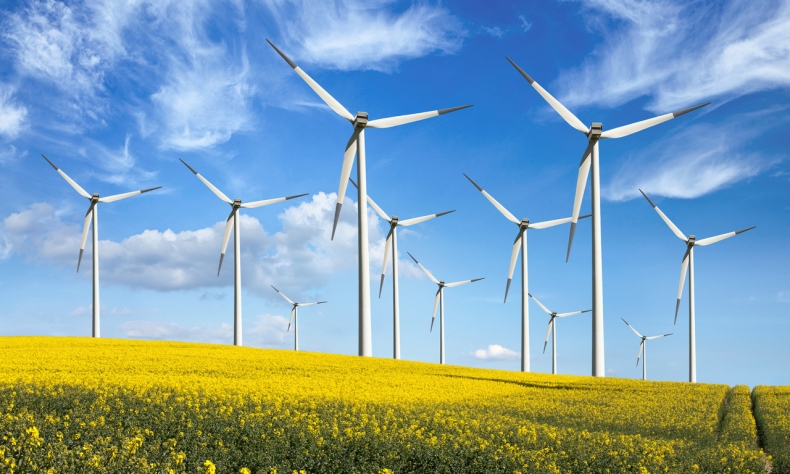China Firmly Implements Commitment to Tackling Climate Change

China vows to build a shared future for all life on the earth. The commitment to carbon neutrality and the actions taken to deal with global climate change will not only benefit mankind, but also all life and ecosystem on the earth.
Chinese President Xi Jinping announced on December 12 China’s further commitments for 2030 to contribute more to tackling the global climate challenge, when addressing the Climate Ambition Summit via video link.
He said China will lower its carbon dioxide emissions per unit of GDP by over 65 percent from the 2005 level, increase the share of non-fossil fuels in primary energy consumption to around 25 percent, increase the forest stock volume by six billion cubic meters from the 2005 level, and bring its total installed capacity of wind and solar power to over 1.2 billion kilowatts.
This is the second time that President Xi made important pledge to cope with climate change in multilateral occasions this year. In September, President Xi announced at the 75th general debate of the UN General Assembly that China will enhance its National Determined Contributions (NDC) and adopt policies that are more effective and measures. China will strive to bring CO2 emissions to peak before 2030, and strive to achieve carbon neutral by 2060.
Responsible and constructive
In the global response to climate change, China has always played a constructive and responsible role, and contributed to the conclusion of the Paris Agreement. China’s announcement of carbon neutral is of great significance in the process of tackling climate change, marking the turning point of the world’s common response to climate change and is crucial for the common goal of the world to achieve the Paris agreement.
These commitments highlight China’s new vision of green transformation and shows China’s great determination to tackle climate change. These commitments also attract worldwide attention.
As a developing country, China has increasingly attached great importance to climate change. China has set up a national climate change coordination agency and formulated a series of policies and regulations related to climate change in accordance with the requirements of the national sustainable development strategy, which has made positive contributions to the mitigation and adaptation of climate change.
China has actively participated in the international negotiations on the United Nations Framework Convention on Climate Change (UNFCCC) and global climate governance. As an important obligation to fulfill the UNFCCC, the Chinese government formulated the “China’s National Plan for Coping with Climate Change” in 2007.
In accordance with the requirements of the UNFCCC, China has completed three rounds of National Assessment Report on Climate Change. Now Chinese scientists are working on the 2021 version of the assessment report.
In addition, from 2009 to 2019, China has released the annual report on China’s Policies and Actions for Addressing Climate Change for 10 years in a row, showing the latest progress of China’s response to climate change to the international community.
In 2009, the National People’s Congress (NPC) adopted the Resolution on Actively Responding to Climate Change. The resolution pointed out that addressing climate change is an important opportunity and challenge for China’s economic and social development. China must take practical measures to actively deal with climate change, including strengthening the legislation, improving the awareness and ability of the whole society, and actively participating in international cooperation in the field of climate change.
In 2016, the NPC approved the outline of the 13th Five-Year Plan for national economic and social development, which stipulates the contents of actively responding to global climate change, effectively controlling greenhouse gas emissions, actively adapting to climate change and extensively carrying out international cooperation.

Legislation effort for environment
In lawmaking, China revised the Environmental Protection Law in 2015, which stipulates the relevant contents of dealing with climate change. Article 6 stipulates that citizens should enhance their awareness of environmental protection, adopt a low-carbon and thrifty lifestyle, and consciously fulfill their environmental protection obligations.
In addition to the Environmental Protection Law, China has also enacted a series of laws related to climate change, respectively for the air pollution prevention and control, forest, grassland, wildlife protection, agricultural, energy conservation, renewable energy, land, cleaner production promotion and circular economy promotion.
These laws provide a legal guarantee for addressing climate change in all areas of the country, and are also China’s domestic legislative response to international laws and organizations such as the UNFCCC.
It is worth mentioning that in recent years, under the overall framework of the construction of ecological civilization and the rule of law, China has carried out legislative preparations for the formulation of a special climate change law.
In 2015, China issued the Opinions on Accelerating the Construction of Ecological Civilization and the Overall Plan of Ecological Civilization System Reform, which clearly required the study, formulation and improvement of laws and regulations in response to climate change.
In 2016, the 13th Five-Year Plan for Greenhouse Gas Emission Control issued by the State Council further promotes the lawmaking on climate change. In the same year, the plan for making a special law of climate change was included the agenda of the State Council for the first time. Today, the legislation for climate change has officially entered the drafting stage. In near future, China will formally issue a special law for climate change, which will provide a strong guarantee for China’s goal of carbon neutral.
Also, China is seeking cooperation with other countries on environment and climate change. This year China and European Union has reached consensus to establish green partnership mechanism. With the mechanism, China and EU can carry out cooperation and exchange in the field of climate change legislation, and jointly promote the formulation and realization of carbon neutral strategic goals.
With vigorously promoting domestic legislative process and participating in the global governance system, China is becoming a significant participant and contributor in the global response to climate change.
China’s commitment to carbon neutral and the actions taken to deal with global climate change will not only benefit mankind, but also all life and ecosystem on the earth.
Gender-based Solutions to Improve the Climate Change Adaption and Global Governance
 Facebook
Facebook
 Twitter
Twitter
 Linkedin
Linkedin
 Google +
Google +



